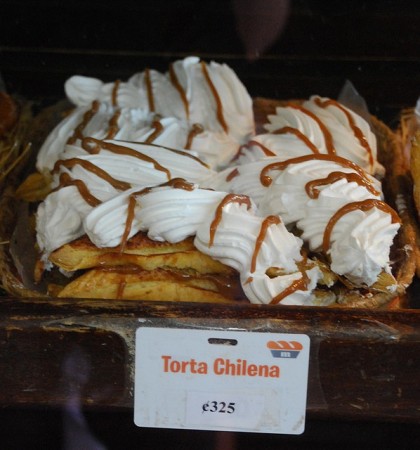I was sitting at the dining room table of a friend’s beach house a few years ago in Maitencillo, when someone offered me a bite of something they were eating, holding out the fork to me. It was some kind of cake. And since I don’t like Chilean cake, generally speaking, I was going to say no. But to be nice (because this is nice in Chile, although, as we’ve discussed before, nice is relative), I took the fork, took a bit, and ate it.
“Que bien, no eres escrupulosa” (That’s cool, so you’re not escrupulosa) said C, the owner of the house.
And I thought about it. Escrupulosa sounds very close to scrupulous, and if someone said to me, “you’re not scrupulous” (which they wouldn’t, because normally we use the form “unscrupulous,” in which case they’d say, “you’re unscrupulous,” I’d be miffed. Plus what does that have to do with cake?
Unscrupulous means unprincipled. You’ll do anything to get ahead. I don’t think that describes me. I like to think I have standards, and I hope all those sponsored post people who want me to sell space to put up generic content about a city in Nevada with the initials LV that I’ve never even been to would realize that and stop sending me email.
So what about not being escrupulosa? And what does that have to do with “cake” (which I put entre comillas(in quotes) because it was mil hojas which is essentially many layers of thin cardboard spread with manjar (dulce de leche), and if you are particularly unlucky, there is sometimes raspberry jam involved. I say unlucky because caramel and raspberry are two flavors that are fine on their own, but do not ever have to meet in my mouth.
Or on my fork. Which is where “escrupulosa” comes into play.
As it happens, “escrupulosa” means sort of “easily grossed out, especially with regards to food,” or in this case, germs. (Diccionario de la lengua española RAE lists the second definition of ecrupulo as: Aprensión, asco hacia alguna cosa, especialmente alimentos). It can also mean scruples, or a few other things, but the only way I’ve ever heard it used in Chile is in terms of how asquento (easily grossed out) someone is with respect to food. Actually, asquento is probably too strong, in Chile, you might say “me da cosa,” (literally: it gives me thing, where thing is akin to the heebie jeebies. I do love to trot escrupulosa on the many occasions on which I’m expected to share a bombilla (metal straw for drinking mate), or offered a sip of someone’s drink. Just for the vocab cred, you know.
And actually, I am a bit “escrupulosa.” I will not take heroic efforts to not share forks or cups, though it’s not my preference. I figure I’m way more likely to get sick from a child sneezing on me (see: strep throat of 1997) than I am from sharing a fork with a healthy person, so in the name of keeping things relaxed with my friends, I decided to make this cultural leap, unprincipled though it may have been.
Also the image above is of “torta chilena,” which I saw in Nicoya, Costa Rica at a bakery, as I was just getting ready to start my long bike ride, and like “american sauce,” (salsa americana, in Chile a kind of relish sold at the supermarket, it has carrots in it), or the mysteriously-named “macedonia” (finely-chopped fruit salad with orange juice poured over it, this cake looks like nothing we eat in Chile. It is clearly not milhojas, as a) it is covered in meringue and b) it is completely lacking in cardboard.











The funniest thing for me is how this word is part of English and Spanish having words that map very well to non-cognates in the other language, which in turn map well to other non-cognates. Like buttoning up a shirt crooked.
Ética=scruples. Escrupulosa=fastidious. Fastidiar=to bother.
fastidious about food. Spanish speakers also have to worry about molestar not meaning to molest. and oh! cínico to mean a liar. Tricky stuff.
I use escrupulosa as you do. I’ve never been called that in Chile I always get the “ay que mañosa eres”, which in Puerto Rico doesn’t mean that either. I don’t like Chilean tortas or the weird flavor combinations they use hahaha.
When I was in school and learning English we used to say the words in Spanish but with a different ending yo make it sound like in English. For example “Teacher he’s molesting me.” from molestar. That’s how we learned that molest in English isn’t the same as molestar in Spanish which in Chile I’ve heard as tocaciones.
Aah, the power of language! I really enjoyed this post =)
Thanks Natalie! I think of maños@ as meaning you don’t like a particular food, or you’re picky, not that you wouldn’t eat off of someone else’s fork. I also like quisquillosa, but I guess that’s different as well, more like everything bothers you!
I’ve never heard the word tocaciones, but believe me, the add-an-o is very popular in Spanish classes all across the English speaking world. To wit: embarazado. Need I say more?
I once told a future boss I was excitado to have received my visa so I could go work in South America.
and did that cause éxito or did he show you to the éxito (Which I have seen on a sign in a Japanese resto here).
😉 Thanks!
The word scrupuloso always makes me think of these large billboards I would see all over Bogotá that would say something to the effect of NO TE DEJES ENGAÑAR POR PERSONAS INESCRUPULOSAS. ESTA TIERRA *NO* SE VENDE, *NO* SE HIPOTECA, *NO* SE ARRIENDA, *NO* SE PERMUTA. Scary stuff 🙂
I have to ask, did you have a pic of that sign, or just remember that off the top of your head? Also, you’re welcome.
We seldom see the word inescrupulosa here. It would be “estafadora,” I think. Which seems qualitatively different, but then, Colombia is qualitatively different from Chile!
I just remembered it 🙂 Like I said, I saw it all over the place.
Maybe estafadora doesn’t convey quite the same judgment call on overall character as unscrupulous and is also more specific.
I don’t know/remember if escrupuloso is used this way in Colombia. Other good words I think of in English are germaphobe and squeamish. Another word that comes to mind for qualms/scruples is remilgos, and I know I’ve heard remilgoso for picky/finicky.
I don’t care for Colombian cake either, which is a crying shame because they look so beautiful in the pasterlerías! But then they always disappoint, inevitably.
Macedonia! Susan Gal and Judith T. Irvine say that Macedonia=fruit salad comes from the French: “Macedonia was imagined in fiction as well as travel writing as a place of chaos and confusion, a veritable fruit salad–inspiring the French culinary term macédoine–of people, religions, and languages” pg 63 Language Ideology and Linguistic Differentiation
oh those travel writers..
More on Macedonia…Yes, it really was considered to be “ethnically chaotic” in pre-World War I Europe as no one ethnic group dominated in that part of the Ottoman Empire (at that time): Greeks, Slavs, Albanians, Turks, etc… Not to mention the mix of religions. It was seen as a kind of incarnation of nationality chaos in a Europe that was fixated on having more or less single nationality nation states at the time.
One of those times when politics, travel, language, and food mix!
Regards
ah, thanks Eric. That makes sense. I hadn’t really thought about it. Now, why does the same fruit salad with marshmallows and shredded coconut in it have the name “ambrosia” in English? Ick.